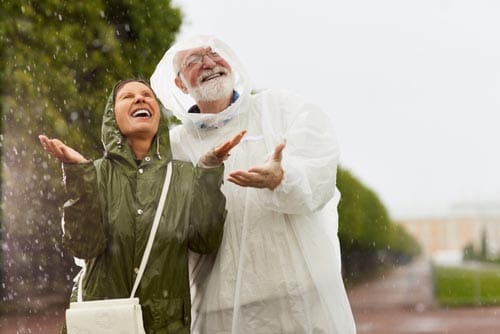Since ancient times, people have blamed rainy weather for achy joints. But a major new Harvard study shows the weather likely has no effect on joint pain.1
Dr. Anupam Jena of Harvard Medical School’s Department of Health Care Policy led the study, which used a “big data” approach. It analyzed insurance claims from millions of doctor’s visits and linked them to daily rainfall totals from thousands of weather stations.2
The study examined the Medicare records of more than 11 million doctor’s office visits by older Americans between 2008 and 2012.
The data showed that patients actually complained slightly more often of joint pain on dry days than rainy ones. On rainy days, 6.35% of the office visits included reports of pain. On dry days, the number was 6.39%.
This held true even among people with rheumatoid arthritis. Many RA patients believe that this autoimmune disease flares up during rainy spells.
“No matter how we looked at the data, we didn’t see any correlation between rainfall and physician visits for joint pain or back pain,” said Dr. Jena.
“The bottom line is: Painful joints and sore backs may very well be unreliable forecasters.”
The study was published in the British Medical Journal.3
The theory that weather causes certain health symptoms dates back to ancient Greece. In an essay called On Airs, Waters, and Places, Hippocrates, the father of modern medicine, advised doctors to study how changing seasons, prevailing winds, and weather patterns affect human health.
Beliefs about joint pain and the weather may endure because they are self-fulfilling, Dr. Jena said. If you expect your knee to hurt when it rains and it doesn’t, you forget about it, he said. But if it hurts when it rains, it tends to stick in your mind.
“Pain is pain, with or without rain,” Dr. Jena said. “But it’s important to know that, at the clinical level, joint pain does not appear to ebb and flow with the weather.”4
The Best Natural Remedy for Joint Pain
Conventional doctors commonly treat joint pain—especially knee pain caused by osteoarthritis—with celecoxib. It’s one of the world’s biggest-selling and most dangerous pain relievers.
Sold under the brand name Celebrex, it increases the risk of heart attack, strokes, and death by 37%. It increases your chances of an ulcer by 81%.5
There’s a better solution. Recent research shows that the natural pain reliever chondroitin sulfate is just as effective at reducing knee pain as celecoxib. But it comes without the health risks.
In a study of 604 people with knee osteoarthritis, Belgian researchers found that 57% of chondroitin takers reported their quality of life was unaffected by pain.
The figure for celecoxib takers was about the same. But twice as many celecoxib takers reported side effects such as stomach pain.6
The researchers used what is called “European pharmaceutical grade” chondroitin. It contains 95% purified chondroitin 6-sulfate and chondroitin 4-sulfate.
Many chondroitin supplements sold in drug stores and supermarkets often contain cheaper grades of the active ingredient. You can find European pharmaceutical grade chondroitin at health food stores. It’s also available online.
Editor’s Note: There are powerful, natural solutions that can help you conquer arthritis pain… Like the desert herb that may replace pain prescriptions for both osteoarthritis and rheumatoid arthritis.
Get all the details HERE.
Like this Article? Forward this article here or Share on Facebook.
References:
1 https://consumer.healthday.com/bone-and-joint-information-4/pain-health-news-520/rain-may-not-cause-achy-joints-after-all-729344.html
2 https://medicalxpress.com/news/2017-12-link-achy-joints-rainy-weather.html
3 http://www.bmj.com/content/359/bmj.j5326
4 https://medicalxpress.com/news/2017-12-link-achy-joints-rainy-weather.html
5 https://www.institutefornaturalhealing.com/2017/08/chondroitin-works-well-drugs-stop-knee-pain-study-shows/
6 https://www.institutefornaturalhealing.com/2017/08/chondroitin-works-well-drugs-stop-knee-pain-study-shows/

